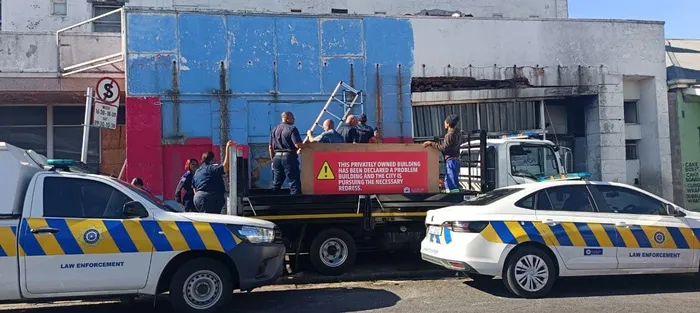Wynberg's urban decay persists despite the declaration of a problem building

263 Main Road in Wynberg has officially been declared a problem building under the City of Cape Town’s by-laws and Law Enforcement has initiated eviction proceedings for current unlawful occupants.
Image: supplied
The derelict building at 263 Main Road in Wynberg has officially been declared a problem building under the City of Cape Town’s by-laws — a significant step in addressing long-standing concerns about safety and misuse, said ward 62 councillor Emile Langenhoven.
However, some residents argue the area is steadily sliding into chronic urban decay. Despite rising rates and repeated promises from the City, they say core issues remain unresolved and that current crime-fighting efforts fail to address the root causes of the decline.
“The Wynberg precinct is no different from Yeoville or Hillbrow,” said property owner Andrew Charman. “If Capetonians believe the City has the ability or political will to tackle complex urban management challenges, they are mistaken.”
“In this crisis area, the deployment of LEAP officers should be seen as a performance gesture. Our rates should be better utilised on strategies with measurable and accountable outcomes. Their deployment does not address the fundamental issues underpinning chronic urban decay in places such as the Wynberg railway precinct. Their impact is small, if any at all.”
Mr Charman, who owns property in the precinct, described the City’s approach as rudderless.
“For over a decade, City officials and political leaders have promised stern action against problem buildings. A high court case against the Uli Heydt building was said to be imminent. Nothing happened.”
One such case involves the late Uli Heydt, owner of several slum buildings in Wynberg. In June 2022, the City threatened him with court action and possible confiscation of his properties unless he fixed them. Heydt owned 8 and 10 Ebor Road and 263 Main Road, divided by Ebor Lane.
After the City took him to court over a R5 million municipal debt, a deal saw the debt reduced to R1.3 million and the properties removed from the City’s top-10 problem-buildings list. However, the City says he reneged on the agreement by not paying.
“Our politicians pat themselves on the back for investments like the Wynberg Centre but turn a blind eye to widespread by-law infringements and the steady encroachment of slum buildings. At least five buildings in the precinct have experienced major fires, yet they remain unsafely inhabited. Grey water still flows down the street as it has for the past decade. Waste is dumped throughout public spaces. Potholes remain unfilled,” Mr Charman said.
He said socio-economic issues also need addressing, including medical support for homeless people with severe mental illness and the open sale of drugs. Streets like Ebor Road, he adds, have become a carnival of drinking, drugging, braaiing and partying every evening, especially on weekends.
“I’ve given up calling Law Enforcement. The officers have little grasp of the myriad by-laws they are mandated to enforce and lack the initiative or experience to deal with difficult situations.
“It’s concerning to watch LEAP trainees aimlessly walking through the precinct, chatting among themselves, clearly unwilling or unable to intervene in this complex environment of drug dealing, public drinking, homelessness and more.”
According to ward councillor Emile Langenhoven, the Uli Heydt’s buildings were eventually reinstated on the problem-buildings list. He confirmed that while 263 Main Road was earmarked for the list in 2023, formal declaration only happened recently.
“The process involves inspections, compliance notices, and allowing time for objections or remedial action. 263 Main Road has now been formally declared a problem building. Law Enforcement is now empowered to proceed with evictions of unlawful occupants and to secure the premises.”
Mayco member for safety and security, JP Smith said LEAP is deployed to crime-affected precincts to assist SAPS and is not assigned to Wynberg for by-law enforcement.
“The City is planning to deploy a dedicated Metro Police officer to wards including Wynberg to assist with by-law enforcement, crime prevention, and traffic enforcement,” Mr Smith said.
In response to claims that the City’s crime-fighting efforts fail to address the root causes of chronic urban decay, City spokesperson, Luthando Tyhalibongo said, the Mayoral Urban Regeneration Programme (MURP) had deployed 12 Wynberg Ambassadors for patrols, focusing on crime prevention and reporting service faults.
“Community Safety ambassadors have been consistently present for the past six months and during peak seasons over the last three years,” he said.
“Additionally, MURP deployed two-armed response vehicles during the day and night with armed guards providing a visible security presence that directly addresses social challenges contributing to crime in the CBD area. These interventions had reduced crime within the CBD and Public Transport Interchange areas over the last few months.”
Mr Smith added that these combined measures aim to reduce crime, increase visible policing, and directly tackle some of the underlying social issues contributing to chronic urban decay in the Wynberg precinct.
Responding to complaints about grey water runoff, illegal dumping, potholes, and by-law violations, the City’s Mayco member for water and sanitation, Zahid Badroodien, said teams rely on logged service requests to identify faults like burst pipes and overflowing sewers. He further urged residents to always report such service requests to help teams to attend to these matters as quickly as possible.
Related Topics: